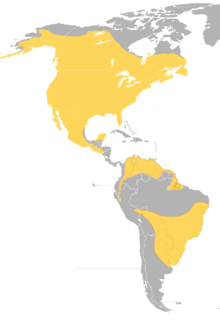Great Horned Owl
| Great Horned Owl | ||||||||||
|---|---|---|---|---|---|---|---|---|---|---|

Great horned owl ( Bubo virginianus ) |
||||||||||
| Systematics | ||||||||||
|
||||||||||
| Scientific name | ||||||||||
| Bubo virginianus | ||||||||||
| ( Gmelin , 1788) |
The Great Horned Owl ( Bubo virginianus ) is a bird art from the genus of eagle owls ( Bubo ) that the family of authentics owl (Strigidae) and to order the owls heard (Strigiformes). It is closely related to the Magellanic Eagle Owl ( Bubo magellanicus ), which has long been considered a subspecies of the Great Horned Owl .
features
The great horned owl is one of the largest owl species on the American continent with a length of 46–63 centimeters and a wingspan of 91 to 151 centimeters. The females are 10-20% larger than the males. The weight of the great horned owl is 900–1800 g. The plumage color varies from gray to red-brown. On the underside, dark stripes run along his body and a white band on his chest. The belly is a little lighter than the back. It has long ears or "horns" which explain its English name, the Great Horned Owl . As with all eagle owls, however, these feather ears have no significance for the sense of hearing . The large eyes are yellowish orange in color. The feet are feathered up to the claws.
The male's singing is a deep, wide-sounding bu-bubú booh booh that is repeated at intervals of several seconds. The female sings similarly, but has a different rhythm and calls bu-bububú booh .
habitat
The great horned owl prefers open landscapes with trees or forest edges, but also wooded mountain regions up to 4,000 m altitude and even parks.
Diet and Lifestyle
The great horned owl feeds primarily on mammals that can weigh up to three times its own body weight, including rats , mice , rabbits and skunks , but also on birds such as pigeons , ducks and other owls. The hunt usually takes place in gliding flight, the prey is struck in a dive with the wings drawn up. He hunts fish , amphibians and small alligators , sometimes walking on the ground and even in the water.
Great horned owls can live over 30 years in captivity, and wild animals rarely live more than 15 years.
Voice and procreation
During the mating season in January and February, males and females let out the typical call hu-hu huuh hu-hu . The male's voice is deeper than that of the female.
Like most eagle owls, great horned owls don't build nests, but like to use abandoned birds of prey nests. Their eggs (two to four in a clutch) are hatched within 28-35 days, with only the females incubating. The young animals climb out of the nest after six to seven weeks, and after nine to ten weeks the young are fledged.
The parents often share the same territory for many years, but live solitary outside of the breeding season.
distribution
The great horned owl is found in much of North America outside the Arctic, as well as in some regions of Central and South America . In southern South America, its distribution area borders on that of the closely related Magellan owl , which inhabits the Andes region as far as Tierra del Fuego. According to the IUCN, the species is currently not endangered.
Subspecies
The following subspecies are distinguished:
- B. v. virginianus
- B. v. lagophonus
- B. v. algistus
- B. v. saturatus
- B. v. pacificus
- B. v. elachistus
- B. v. subarcticus
- B. v. wapacuthu
- B. v. occidentalis
- B. v. arcticus
- B. v. heterocnemis
- B. v. scalariventris
- B. v. mayensis
- B. v. mesembrinus
- B. v. pallescens
- B. v. nigrescens
- B. v. colombianus
- B. v. nacurutu
- B. v. scotinus
- B. v. elutus
- B. v. icelus
- B. v. neochorus
- B. v. deserti
supporting documents
Single receipts
- ↑ König et al., P. 319
- ↑ Bubo virginianus . BirdLife International , accessed February 16, 2016 .
literature
- Claus König , Friedhelm Weick: Owls of the World . Christopher Helm, London 2008, ISBN 978-0-7136-6548-2
Web links
- Bubo virginianus in the endangered Red List species the IUCN 2008. Posted by: BirdLife International, 2004. Retrieved on January 3 of 2009.
- www.owlpages.com about the great horned owl (with voice)
- Videos, photos and sound recordings of Bubo virginianus in the Internet Bird Collection
- Avibase

